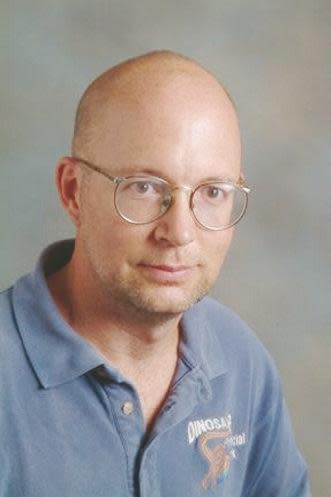Tim Pennings: Afraid of dying?
Last month in her Jan. 14 Holland Sentinel column, Janet Weisiger raised a thought-provoking question: “Are you afraid of dying?” She detailed her own strong belief in the caring, loving God described in the Bible and in God’s promises such as John 3:16.
I am not presently reading through the Bible yearly as she is, but I know it well. While in college, I wrote my own four-notebook commentary covering the entire Bible using (and recommending!) the three-year daily study guide “Search the Scriptures” by Intervarsity Press.
Yes indeed, the Bible makes claims about eternal life. There are explicit New Testament references such as Jesus telling his disciples (John 14:2) that he will prepare a place for them. But there are Old Testament hints as well — even in the most ancient book of the Bible, Job. After Job’s time of trial allowed by God which stripped Job of all that he had, God restores to Job double the wealth, double the flocks, double the herds, BUT just the same number of children who had died. Was that because the dead children still lived in the afterlife — so Job’s number of children had in fact doubled too?
However, Weisiger and I do apparently differ in our epistemologies, perhaps depending on our respective personalities.

I am skeptical about drawing conclusions of things unseen. Being honest with myself, I don’t share Weisiger’s confidence in the things she believes about God and the afterlife. Instead, I question if there is a creator God of the universe, or whether the physical universe itself is the ultimate thing. Either is possible. It’s a toss-up.
If a creator God exists, is God a personal God who loves and watches and cares for us and “knows the number of hairs on our heads” (easy in my case)? Or is God possibly a deistic God, as believed by some of our Founding Fathers, who made the world and is now letting it go of its own accord? Either is possible. Note that the lack of present-day miracles is not a case against a personal God. Consider a farmer’s relationship to his fields. There are special times when the farmer is active — planting, weeding, harvesting, but otherwise the attentive, ever-present farmer carefully watches. Similarly, the Biblical record suggests a loving God who has been active at crucial times in the history of the world, but otherwise lets it run much on its own without obvious interference.
If a personal God does exist, is God as described in the Christian Bible? There are other monotheistic religions with different claims. Jewish faith, for example, places little emphasis or belief in the afterlife. Their faith, as I understand, is much more rooted in this present existence.
And even within the realms of Christian belief, there are questions about life beyond this. Once when I pressed for an answer, a pastor told me, “We will remain in God’s love.” That was as specific as the pastor claimed.
Lots of uncertainty. So to answer Weisiger’s question, I am not afraid of dying — but for reasons different than hers.
Accepting that this life is possibly all there is frees one from the unease of hoping for more without being sure. Some may be energized by “things hoped for; the evidence of things not seen.” (Hebrews 11:1) But for others, including myself, uncertainty generates disquietude. It feels better to learn to be content with what one has — this present life. This was the wisdom of Epicurus.
But how to be content? Briefly, I don’t feel robbed that I was not alive to experience life in the 1800s. Similarly, I accept that I will not live to experience the 2100s. I accept that I am experiencing a brief bit of the universe right NOW. So I want to make the most of it by living fully in the present while hopefully impacting the future world for good. Then I will die satisfied.
Interestingly, mathematics offers another consolation of sorts. Using the logarithmic scale, human size is about halfway between the smallest thing (Plank’s quantum distance) and the largest (the universe itself). That is, we are as many times larger than the smallest thing as the entire universe is larger than us. But in contrast, a typical human lifespan (70-80 years) is a full 85% of the way along the logarithmic scale from the smallest quantum time unit to the age of the universe. Not bad! Take advantage!
— Community Columnist Tim Pennings is a resident of Holland and can be contacted at timothy.pennings@gmail.com. Previous columns can be found at timothypennings.blogspot.com.
This article originally appeared on The Holland Sentinel: Tim Pennings: Afraid of dying?
